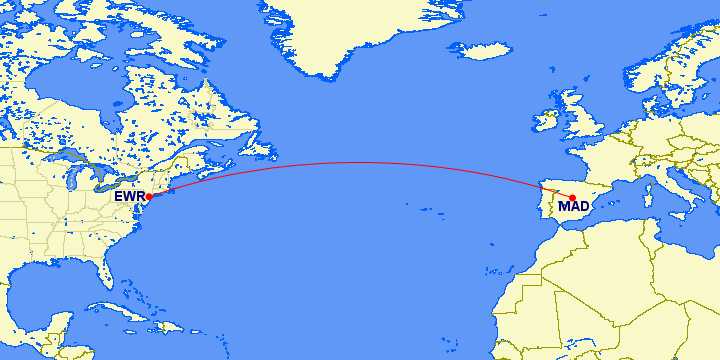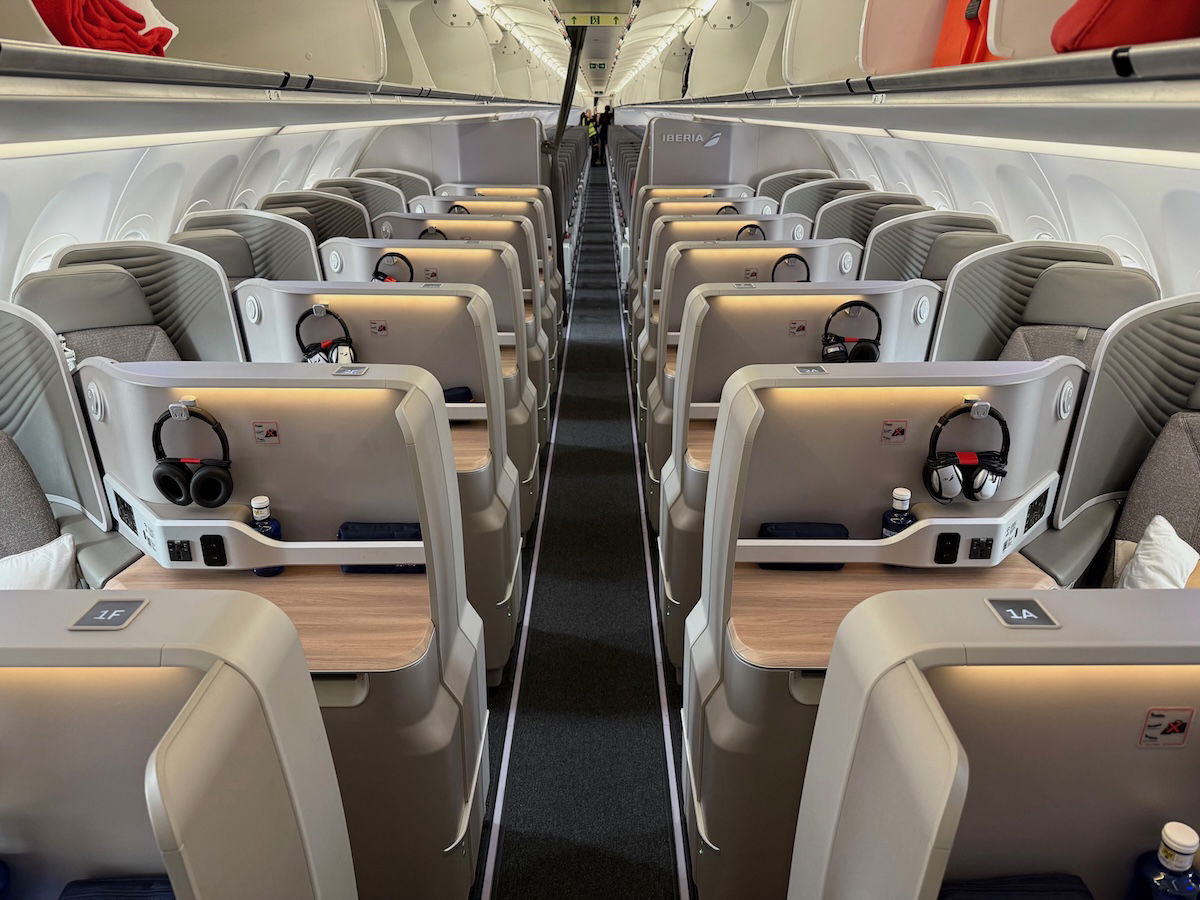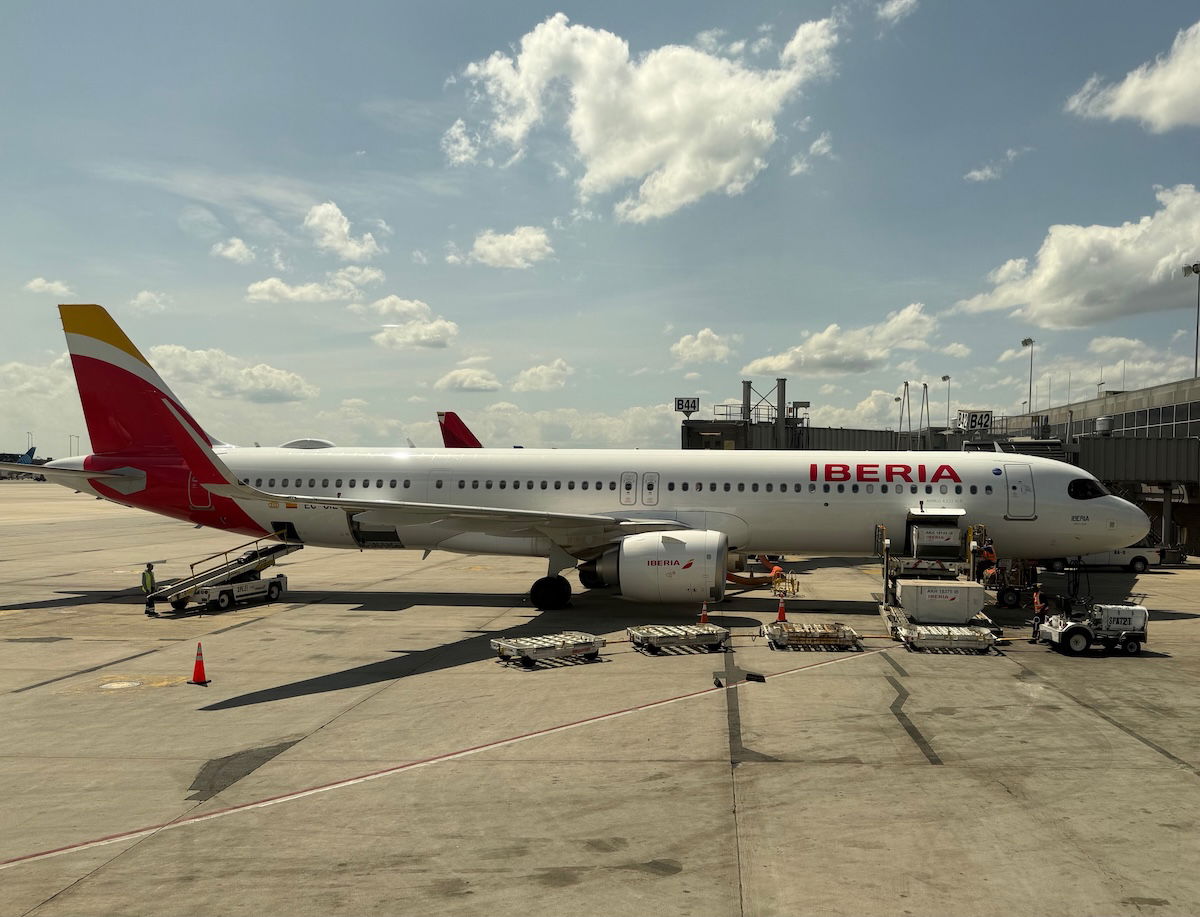Iberia has just announced its newest transatlantic route. While it wasn’t necessarily one we were told to expect, I also don’t think it’s terribly surprising.
In this post:
Iberia will add flights to Newark, New Jersey
As of March 29, 2026, Iberia will launch a new daily flight between Madrid (MAD) and Newark (EWR). The flight will operate daily with the following schedule:
IB327 Madrid to Newark departing 7:35PM arriving 10:25PM
IB328 Newark to Madrid departing 11:55PM arriving 1:20PM (+1 day)

The 3,606-mile flight is blocked at 8hr50min westbound and 8hr25min eastbound. Iberia will use an Airbus A321XLR for the service, featuring 182 seats. This includes 14 business class seats and 168 economy seats. This is Iberia’s new long range narrow body plane, and you can read my review of Iberia’s A321XLR business class here, and my overall thoughts on the A321XLR here.

How the Newark route fits in Iberia’s network
Newark will be Iberia’s 11th destination in the United States, complementing service to Boston (BOS), Chicago (ORD), Dallas (DFW), Los Angeles (LAX), Miami (MIA), New York (JFK), Orlando (MCO), San Francisco (SFO), San Juan (SJU), and Washington (IAD).
What’s interesting is that with Iberia’s “Flight Plan 2030 concept,” the airline had claimed that Philadelphia (PHL) was the next destination in the United States under consideration. However, it seems that Newark got new service first.
Here’s how Iberia’s Chief Commercial, Network Development, and Alliances Officer, María Jesús López Solás, describes this:
“Our new flight to Newark is a tangible example of how Iberia is bringing our Flight Plan 2030 to life — a roadmap designed to consolidate our position as the leader in connectivity between Europe and the Americas. The addition of Newark not only strengthens our presence in New York with a third daily frequency but also expands options for our customers by offering greater flexibility in schedules and fares, along with the advantages of multi-frequency service. Newark’s proximity to Manhattan makes it an excellent choice for the corporate market. Furthermore, diversifying between John F. Kennedy International Airport and Newark allows us to optimize operations and better adapt to market needs, reinforcing our position along one of the most strategic corridors across the Atlantic.”
This route seems like a safe enough bet. United and Star Alliance dominate Newark, though this service will be part of the oneworld transatlantic joint venture, and it complements service to Newark from British Airways and Aer Lingus, plus Iberia’s existing up to twice daily flights to New York.
Ultimately Newark acts as another option for traveling to Manhattan, but also serves a market distinct from Kennedy.
The A321XLR, especially as Iberia has configured it, isn’t exactly a high margin aircraft. Given the limited number of business class seats, and the lack of premium economy, I don’t think this is going to be some financial game changer for the airline. But hey, this also doesn’t seem like much of a risk…
Bottom line
As of March 2026, Iberia will launch a daily flight between Madrid and Newark using an Airbus A321XLR. This will be Iberia’s 11th destination in the United States, complementing service to Kennedy. It’s interesting that Newark service came before Philadelphia service, but I’m sure that’s not going to follow too much later.
What do you make of Iberia adding service to Newark?





I wish Iberia or other airline to start Madrid - Houston. Hard to imagine Houston not having a single flight to Spain given the diversity of Houston.
Like the late timing out of Newark
Happy to see more IB routes (and thus more flights on which I might find award availability!) but EWR's older terminal(s) are disgracefully obsolete. Not a fun departure location.
If La Compagnie is able to do ORY-EWR with normal A321s (not XLR) which they now have had for several years (are they even NEOs?), why does Iberia need the XLR ? The distances are the same.
Admittedly La Compagnie's load is much lighter in terms of passengers (only 76, all Business), but carriers with full passenger loads regularly fly non-XLR A321s between NYC and the western-most parts of Europe..
Air India reconfigured B787-8 could have between 20-24 seats in business class
28 seats in premium economy.
And about 240-250 seats in total.
There are pictures of the cabin currently making rounds on X and other platforms.
It’ll be interesting to see how the swap equipment in and out based on demand. JFK is down to a 321xlr and a 330 now, but back to a 330 and 350 for the spring/summer
This is good, Iberia offers good fares
Are you going to say every new A321XLR route won’t be “a financial game changer for the airline” :)
Yep it's pretty much copy and paste opinions.
It's weird that he also doesn't factor in the lower operating costs too.
it's also worth noting that US-EU treaties require that new flights supersede slot and schedule controls by the FAA - which means that these new international flights at EWR effectively reduce UA's ability to operate as many flights - or add congestion if UA maintains its same level of schedule.
EWR has long had considerably less int'l service than JFK; the growth of foreign carrier service will reduce UA's control at the airport.
Most European...
it's also worth noting that US-EU treaties require that new flights supersede slot and schedule controls by the FAA - which means that these new international flights at EWR effectively reduce UA's ability to operate as many flights - or add congestion if UA maintains its same level of schedule.
EWR has long had considerably less int'l service than JFK; the growth of foreign carrier service will reduce UA's control at the airport.
Most European airlines including IB will have more seats on their 321XLRs than AA and UA so the economics will work better.
@Tim
"... so the economics will work better."
...Trying to understand this your last statement, as it's to my knowledge that (using AA configuration) if they can get loads of 90% across all cabins versus 90% on IB configuration, the AA aircraft will generate the most revenue across similar route and pricing (the load percentage could be lowered even to 85% and might still have a slight advantage to IB configuration with 85% load).
@Tim
"... so the economics will work better."
Trying to understand this your last statement, as it's to my knowledge that (using AA configuration) if they can get loads of 90% across all cabins versus 90% on IB configuration, the AA aircraft will generate the most revenue across similar route and pricing (the load percentage could be lowered even to 85% and might still have a slight advantage to IB configuration with 85% load).
The only issue for UA and AA will be getting higher loads across their premium cabins.
Narrowbody aircraft simply have higher unit costs per seat mile than widebody aircraft and that increases even further when a 3rd pilot is required - which is the case for most flights from continental Europe to the US.
AA and UA are uniquely believing that they can get a substantial premium on their longhaul XLRs over what they get now - and that is hard to believe will happen, competing with other airline widebodies...
Narrowbody aircraft simply have higher unit costs per seat mile than widebody aircraft and that increases even further when a 3rd pilot is required - which is the case for most flights from continental Europe to the US.
AA and UA are uniquely believing that they can get a substantial premium on their longhaul XLRs over what they get now - and that is hard to believe will happen, competing with other airline widebodies both on nonstops and on connections. And as much as some people want to believe otherwise, a fairly high percentage of passengers on TATL flights are connecting on one end or another - which means the revenue has to be divided between two segments.
IB and EI are both using about 30 more seats on their XLRs/NEOs; B6 is not even an example of success on their TATL flights.
I do not believe that the AA and UA models for using their XLRs will work financially; AA hasn't been consistently profitable across the Atlantic for years and they think that downgauging to smaller aircraft will help - but the problem is that AA can't get the revenue outside of LHR that DL and UA get. UA flies alot of seasonal flights on narrowbodies which probably do work but TATL fares collapse for 4-6 months. Unless UA intends to put those planes on domestic routes for half the year and offer an inconsistent product (you can't use an international product for half the year and a domestic product for half the year and develop any kind of price premium), the economics won't work for UA either.
@Tim
You didn't necessarily answer my question. I didn't make mention of widebody.
I'm asking how the economics will work better for European carriers with more seats overall and less premium seats compared to what American carriers are doing.
"Unless UA intends to put those planes on domestic routes for half the year and offer an inconsistent product (you can't use an international product for half the year and a domestic product...
@Tim
You didn't necessarily answer my question. I didn't make mention of widebody.
I'm asking how the economics will work better for European carriers with more seats overall and less premium seats compared to what American carriers are doing.
"Unless UA intends to put those planes on domestic routes for half the year and offer an inconsistent product (you can't use an international product for half the year and a domestic product for half the year..."
It's RUMOURED that the leased CFM-equipped A321NEO will be configured similarly to the XLR and will be used for domestic and international route (regional routes but not transatlantic) to LATAM region
and the issue is simply that any internationally configured airplane has to be usable year round or you have excess internationally configured capacity that you can't monetize.
If the XLRs are used on domestic flights for half of the year, the other half of the year they have standard domestic configured aircraft - which means it is difficult to get a revenue premium in the market. The transcons work with premium pricing for multiple airlines...
and the issue is simply that any internationally configured airplane has to be usable year round or you have excess internationally configured capacity that you can't monetize.
If the XLRs are used on domestic flights for half of the year, the other half of the year they have standard domestic configured aircraft - which means it is difficult to get a revenue premium in the market. The transcons work with premium pricing for multiple airlines because the same type of product is there year round.
DL and UA have figured out how to shift TATL widebody capacity to the S. Pacific and N. Africa during the northern winter but you can't dump lots of capacity into the N. Atlantic for the summer and then put it someone place that can't support that much capacity for only six other months per year.
Steven,
your point on the flight timings are valid. Air France has some similarly timed flights from the NE but this is one of the latest flights from the NE to continental Europe.
that could be an advantage for these flights.
"UA's ability to operate as many flights - or add congestion if UA maintains its same level of schedule."
UA isn't operating many 23:55pm departure flights out of EWR.
Some U.S. based passengers would do well to note that not all ‘pond-hoppers’ start their journey in that country.
Also, many European carriers provide a much better ‘pond-hopping’ experience than their U.S. counterparts. Albeit minus the points incentive important to some flyers.
IB its putting their XLR's to good use.
Nice to see another route to MAD from the NY area. This will likely push DL off the market out of NYC entirely to MAD, but also to BCN. Delta is very weak to Spain and its TATL network is a big money looser it seems.
Not to preempt Tim Dunn here, but Delta is not leaving NYC>Spain lol
It's a large market and DL can connect passengers over JFK, at worst.
And I doubt there's anyone in the world that thinks Delta is losing money across the Atlantic.
@MaxPower
I believe he intentionally wrote the nonsense to provoke some reactions and commentary.
@Zephyr
probably true. you're right.
Good to see more variety at EWR and a nice option over the 30+ year old 76s UA sends across the pond on many routes, including MAD.
No one ACTUALLY gives a crap about the age of UA (or anyone's) aircraft. They have some of the newest interiors in the fleet, and that's all 99% of passengers are going to know, much less care, about.